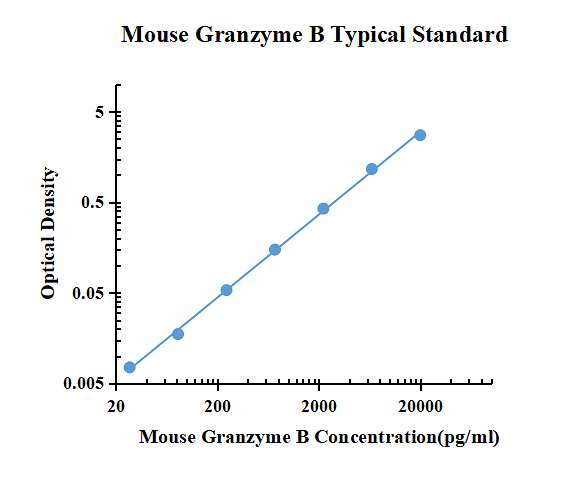Mouse Granzyme B enzyme-linked immunoassay kit
| Specification | 96 Test |
|---|---|
| Sensitivity | 9.91 pg/ml (10 μl) |
| Standard Curve Range | 27.43~20000 pg/ml |
| Standard Curve Gradient | 7 Points/3 Folds |
| Number of Incubations | 2 |
| Detectable sample | Liquid phase sample of soluble substances. For example: serum, plasma, cell culture supernatant, tissue grinding liquid, etc. |
| Sample Volume | 10 μl |
| Type | Fully Ready-to-Use |
| Operation Duration | 120min |

| pg/ml | O.D. | Average | Corrected | |
|---|---|---|---|---|
| 0.00 | 0.0150 | 0.0130 | 0.0140 | |
| 27.43 | 0.0230 | 0.0200 | 0.0215 | 0.0075 |
| 82.30 | 0.0340 | 0.0290 | 0.0315 | 0.0175 |
| 246.91 | 0.0680 | 0.0670 | 0.0675 | 0.0535 |
| 740.74 | 0.1650 | 0.1630 | 0.1640 | 0.1500 |
| 2222.22 | 0.4570 | 0.4220 | 0.4395 | 0.4255 |
| 6666.67 | 1.2100 | 1.1460 | 1.1780 | 1.1640 |
| 20000.00 | 2.7790 | 2.7510 | 2.7650 | 2.7510 |
Precision
| Intra-assay Precision | Inter-assay Precision | |||||
| Sample Number | S1 | S2 | S3 | S1 | S2 | S3 |
| 22 | 22 | 22 | 6 | 6 | 6 | |
| Average(pg/ml) | 341.6 | 1646.5 | 5204.5 | 367.9 | 1876.2 | 5851.4 |
| Standard Deviation | 22.6 | 94.6 | 295.4 | 8.6 | 63.2 | 192.3 |
| Coefficient of Variation(%) | 6.6 | 5.7 | 5.7 | 2.3 | 3.4 | 3.3 |
Intra-assay Precision (Precision within an assay) Three samples of known concentration were tested twenty times on one plate to assess intra-assay precision.
Inter-assay Precision (Precision between assays) Three samples of known concentration were tested six times on one plate to assess intra-assay precision.
Spike Recovery
The spike recovery was evaluated by spiking 3 levels of Mouse Granzyme B into health mouse serum sample. The un-spiked serum was used as blank in this experiment.
The recovery ranged from 107% to 132% with an overall mean recovery of 116%.
Sample Values
| Sample Matrix | Sample Evaluated | Range (pg/ml) | Detectable (%) | Mean of Detectable (pg/ml) |
|---|---|---|---|---|
| Serum | 30 | 10.64-35.31 | 92 | 24.13 |
Serum/Plasma – Thirty samples from apparently healthy mice were evaluated for the presence of Granzyme B in this assay. No medical histories were available for the donors. n.d. = non-detectable. Samples measured below the sensitivity are considered to be non-detectable.
Product Data Sheet
Background: Granzyme B
Granzyme B is a member of the granzyme family of serine proteases found specifically in granules of cytotoxic T lymphocytes (CTL) and natural killer (NK) cells. Granzyme B plays an essential role in granule-mediated apoptosis utilizing the substrates in this pathway, such as Caspase 3, Caspase 8 and Bid. Recent research indicates expanded Granzyme B functionality to include extracellular roles along with its classical pro-apoptotic function. It has been found that Granzyme B is an important mediator of skin injury, repair and inflammation through extracellular substrates including Laminin, VE-Cadherin, Fibronectin and the proteoglycans Aggrecan and Decorin.
As one of the five Granzymes (A, B, H, K and M) identified in the human genome, Granzyme B (32kDa) is the most widely researched in terms of its biological function and its utility in health and disease . It is synthesized as a precursor (247 residues) with a signal peptide (residues 1-18), a pro-peptide (residues 19-20), and a mature chain (residues 21-247). Once inside granules, Granzyme B is fully processed into the mature chain and becomes an active protease when the pro-peptide, Gly-Glu is removed from the N-terminus by cleavage with Cathepsin C. The protease activity of Granzyme B is tightly controlled by Serpin B9/ Protease Inhibitor 9. The amino acid sequence of human Granzyme B is 71%, 69%, and 68% identical to its canine, rat, and mouse counterparts, respectively.
Granzymes have been shown to modulate inflammation, and Granzyme B plasma levels have been found higher with atopic dermatitis and psoriasis when compared to healthy controls. This is in contrast to Granzyme A plasma levels which remain unchanged. Serum from patients with Crohn's disease have significantly higher Granzyme B levels than controls.

